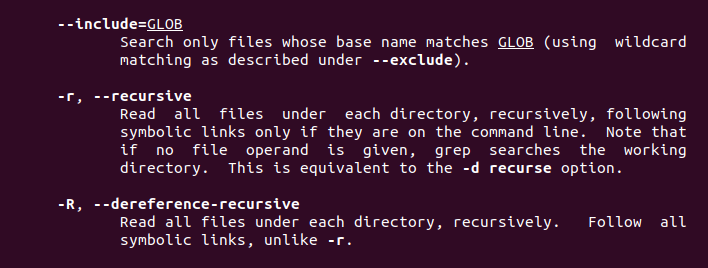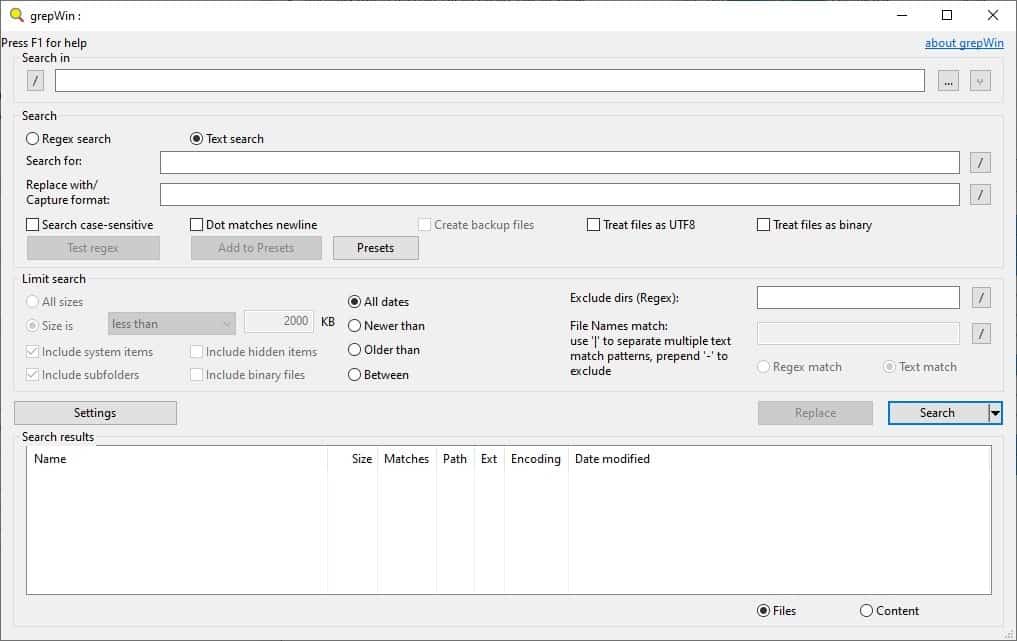

It will skip both “/home/user/work” and “/home/user/stuff/work” if you have “/home/user/work” and “/home/user/stuff/work.” It is not feasible to use the expression “/*/work/*” to limit the exclusion to the former folder name. However, on a broader scale, this could fail. You could also just wait for a lunatic like me to post it online:Īnswered by Max Cantor Solution #5 grep -exclude-dir=".svn"īecause the name “.svn” is so unique, it works. Of course, if you’re like me and have to use the same.bashrc everywhere, you could spend 4 hours building an overly convoluted bash function to put there instead. You can now accomplish the following: sgrep some_var path "*/.svn" -prune -o -print0 | xargs -0 grep' Put this in your.bashrc file to make it portable. Double-grep-ing, on the other hand, can take an eternity if you have a vast codebase. The -exclude-dir option was not available in earlier versions. Psychoschlumpf is right, but only if you have the most recent version of grep will it function. If you use ack (a ‘better grep’), it will handle this for you (along with a slew of other useful features!). Instead, please use an alias or a script.”
#GREP OPTIONS EXCLUDE PORTABLE#
PPS: The following env option has been tagged as deprecated: node/Environment-Variables.html “This feature will be removed in a future release of grep, and grep will warn if it is used, because it presents complications when developing portable scripts. PS: In my version, due to Adrinan, there are a few extra quotes: export GREP_OPTIONS='-exclude-dir=.svn' This is something you can implement in your environment (e.g.bashrc) export GREP_OPTIONS='-exclude-dir=".svn"' If you’re using a Unix system that doesn’t include GNU Grep, try the following: grep -R "whatever you like" *|grep -v "\.svn/*" Note that -exclude-dir is a relatively recent addition to the options for GNU grep, but it should only be missing on very legacy GNU/Linux machines by now. It should function like this if you have GNU Grep: grep -exclude-dir=".svn" Is it feasible to grep a directory recursively while excluding all results from.svn directories? In fact, there is no need to type an entire word.

For this, you need to use the ps -ef grep You can use grep commands to search for specific words in files on your system. Grep exclude binary files, we can use grep -I option, it can ignore binary files when searching.I get a lot of files from the.svn directories when I grep my Subversion working copy directory. There is a way to exclude the command line that features grep processes. When we use the grep command pattern search, we often find some binary files, these are not what we need, so we need to exclude these binary files. ➜ grep -exclude "test.log" -exclude "m.log" "grep" *.log In the following example, we will use the grep –exclude option to exclude one or more files during pattern search. ➜ grep -exclude "file1" -exclude "file1" "keyword" files Grep - exclude syntax # grep exclude a file

excludePATTERN Recurse in directories skip file matching PATTERN. Grep exclude file, as with excluding directories, we can use the grep –exclude option, which will exclude files matching the given file name pattern from the search. includePATTERN Recurse in directories only searching file matching PATTERN. ➜ grep -exclude-dir "test" -exclude-dir "backup" -R "grep".

In the following example, we use grep –exclude-dir to exclude one or more directories. ➜ grep -exclude-dir "directory1" -exclude-dir "directory2" -R "keyword". ➜ grep -exclude-dir "directory" -R "keyword". Grep –exclude-dir syntax # grep exclude a directory Recursively search subdirectories listed. If -R is specified, it excludes directories matching the given filename pattern from the search. Sometimes, when performing a recursive search with the -r or -R options, you may want to exclude specific directories from the search results. Grep –exclude-dir excludes directories matching the given file name pattern from the search. Grep exclude directories, we can use the grep –exclude-dir option, which needs to be used with the grep -R option. ➜ ~ grep -i 'use' test.log | grep -v "option" | grep -v "find" Grep exclude directory In the following example, we will use a pipeline with grep to exclude multiple keywords. ➜ ~ grep -i 'use' test.log | grep -v "option" In the following example, we will use grep to search for keywords and exclude specific keyword. ➜ grep -v "keyword1" file | grep -v "keyword2" |. Grep -v syntax # grep excludes a single keyword Selected lines are those not matching any of the specified patterns. We can use the grep -v option, which can which can invert the match.


 0 kommentar(er)
0 kommentar(er)
